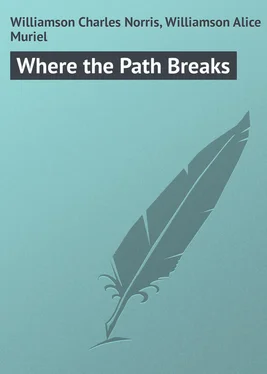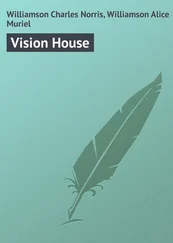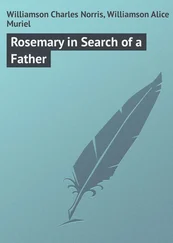Charles Williamson - Where the Path Breaks
Здесь есть возможность читать онлайн «Charles Williamson - Where the Path Breaks» — ознакомительный отрывок электронной книги совершенно бесплатно, а после прочтения отрывка купить полную версию. В некоторых случаях можно слушать аудио, скачать через торрент в формате fb2 и присутствует краткое содержание. Жанр: foreign_prose, на английском языке. Описание произведения, (предисловие) а так же отзывы посетителей доступны на портале библиотеки ЛибКат.
- Название:Where the Path Breaks
- Автор:
- Жанр:
- Год:неизвестен
- ISBN:нет данных
- Рейтинг книги:5 / 5. Голосов: 1
-
Избранное:Добавить в избранное
- Отзывы:
-
Ваша оценка:
- 100
- 1
- 2
- 3
- 4
- 5
Where the Path Breaks: краткое содержание, описание и аннотация
Предлагаем к чтению аннотацию, описание, краткое содержание или предисловие (зависит от того, что написал сам автор книги «Where the Path Breaks»). Если вы не нашли необходимую информацию о книге — напишите в комментариях, мы постараемся отыскать её.
Where the Path Breaks — читать онлайн ознакомительный отрывок
Ниже представлен текст книги, разбитый по страницам. Система сохранения места последней прочитанной страницы, позволяет с удобством читать онлайн бесплатно книгу «Where the Path Breaks», без необходимости каждый раз заново искать на чём Вы остановились. Поставьте закладку, и сможете в любой момент перейти на страницу, на которой закончили чтение.
Интервал:
Закладка:
When he stammered out his questions he had not thought of anything better than an engagement, to end in marriage if he came home safely after the war… The war!.. Dim remembrance of hideous suffering suddenly stirred the slow current of his dream. There had been war. That was how it had happened! He had been killed in battle. Or else, none of the dream was true! There had been no such man, no such girl, no such black and white house reflected in a crystal lake. This was a dream of things that had never been. A veil of unreality began to fall between him and the picture he had seen. No, it couldn’t have been true of his life, of course, because the dream had begun again, and was carrying him on to a wedding. The church in the village … (he knew that church well, and the way to it from the big gates and the little gates; the long way and the short cut) … The girl, and a man in khaki were standing together … the same ugly man, uglier than ever in his soldier clothes, he thought. He heard the words which a clergyman in a white surplice was reading out of the prayer book. “To have and to hold, till death do you part.” And he saw himself putting a ring on the girl’s finger. She held her left hand out to him – the long, slim hand he used to think must be like St. Cecilia’s, because of the genius of music in its finger tips. He could see no following picture of her alone with him. He saw himself going away, waving good-by: then a train and a boat, and a train again, with a crowd of other men, all soldiers.
He was an officer. (He had left the army before that dream-time, he could not remember why, but it had something to do with money – and with the black and white house: and he had offered himself again for the war.) In the dream he rode a horse along a straight sunlit road, with poplars on either side that gave no shade. There were days of marching in furnace heat. Then came a night of silver moonlight reddened by fire; a village burning. There was a noise as of hell let loose: and since he had been dead he hated noise. It was the one unbearable thing. Hearing noise in his dream, the star which was his soul shattered itself into a thousand sparks, each spark a red-hot nerve of pain. All round him in the crowded dream there was fighting. Smoke stung his eyelids. He breathed it in, and choked. His horse trampled men down. Their cries were in his ears. Some voice he knew called to him for help. He pulled a man up on his horse; a friend, he thought it was, some one he cared for. Now the horse stopped, reared, and fell. By and by the man whose soul dreamed, struggled to his feet, dazed, but remembering his friend dragged him from under the hurt animal. Helmets glittered in the moonlight. Eyes glinted red in the copper glare. He fought with a sword and kept off men that pressed on him and his friend, trying to kill them both. A stab of pain shot through his hand. A bugle sounded. Men were running away. He thought they were men of the enemy; a stream of helmets going. He heard his own voice shout an order, but before it could be obeyed a din as of mountains rent asunder roared his voice down. His whole being was swallowed up as a raindrop is swallowed in a cataract. A huge round shape rushed towards him, black against moonlight and flame. Then the world burst and tore him in a million fragments…
His soul coming back to knowledge of its continuance held the impression that this rending anguish of death had been long, long ago, thousands of years ago in time: and that he was now or soon would be waking into eternity. The breaking of the dream and the pain he had suffered ought not to seem important. It ought not to matter to a disembodied spirit. Yet it did matter terribly. Most of all did it matter that the girl with the smoke-blue eyes and copper-beech hair had been swept away from him forever. She was somewhere in the world he had left behind. He did not even know her name, or whether indeed she had really been in his life. Henceforth he would have to wander through space and eternity without finding her again.
The man groaned.
“He’s coming round at last!” a woman’s voice said.
The voice sounded muffled, and far off. It sounded harsh, too. It was not a sweet voice, and it was not speaking his language. Through the gray dimness which hung over him like a cloud, trickled this impression. He wondered why, if the language were not his, he should understand what the voice said.
“G-erman,” he struggled to say, and succeeded with pain in whispering the word.
Somebody laughed. “He knows he’s in German hands!” chuckled the same voice.
An agony of regret fell upon him like an ice avalanche. He was alive, then, whoever he was, and there had never been a girl with smoke-blue eyes and copper-beech hair! She was only a dream. That must be so, because the words she had said to him were all gone from his mind. He could no longer remember anything about her except her face – and those eyes. Those eyes! His interest in past and present abruptly ceased. He let himself slide away into blank oblivion.
CHAPTER II
Hours or years later he waked up with a start, and stared at the light. It was daylight, and he was in an immense room. It seemed big enough for a theater. Perhaps it was a theater. The walls had red panels painted on them, and on each panel one or two cupids danced and threw flowers: repulsive, stout cupids. The ceiling was very far up above his eyes, and there was a dome in the center. From this dome depended a huge crystal chandelier like a bulbous stalactite. There were a great many high windows, with panes here and there opened for ventilation. The windows had no curtains, and the room had no furniture except beds – beds – endless rows of beds, surely hundreds of beds.
He lay in one of these. All were occupied. He could see heads of men whose bodies looked extraordinarily flat. On some of the heads were bandages. Others were shaved, so that they appeared quite bald. They were very pale heads in the bleak, grayish light filtering dimly through the high windows. A number of bunks were hidden by screens. He wished dully that he had this privacy, but his narrow bed had been given no such protection.
A man was slowly walking down an aisle between rows of narrow cots all exactly alike. Beside the man, who had a remarkably large head with a shock of rough, straw-colored hair, was a woman dressed as a nurse. The newly awakened one knew she was a nurse, though she was not dressed in the costume familiar to him in some vague past. There were many in the room wearing the same sort of cap and apron and prim gown that she wore: young women, middle-aged women, old women. They had kind faces, but the watcher saw no beautiful ones. Not that he cared for that, or anything.
He had not been awake long when a big girl came towards him, paused, peered, and went away again. She stopped the nurse who walked with the shock-headed man, and spoke to her. The woman’s cap and the man’s tousled hair turned from the direction they had been taking, and approached his bed. They bent over it, and he gazed up stupidly at their faces. The shock-headed man had a beard even lighter than his hair. He smoothed it with a white, strong-looking hand, a capable hand, the hand of the born surgeon. The woman had hard features, but soft eyes, wistful, and pathetic.
“You see, he is getting along finely,” she said to her companion. “I think we shall have no more trouble with him now.”
The man in bed remembered that he had heard her voice before, and that she had spoken German then, as now. He did not wonder this time why he understood what she said, though the language was not his own. He remembered that he had learned German when he was a boy, and had hated learning it because of the verbs.
“How do you feel?” the surgeon enquired, in English.
Читать дальшеИнтервал:
Закладка:
Похожие книги на «Where the Path Breaks»
Представляем Вашему вниманию похожие книги на «Where the Path Breaks» списком для выбора. Мы отобрали схожую по названию и смыслу литературу в надежде предоставить читателям больше вариантов отыскать новые, интересные, ещё непрочитанные произведения.
Обсуждение, отзывы о книге «Where the Path Breaks» и просто собственные мнения читателей. Оставьте ваши комментарии, напишите, что Вы думаете о произведении, его смысле или главных героях. Укажите что конкретно понравилось, а что нет, и почему Вы так считаете.











